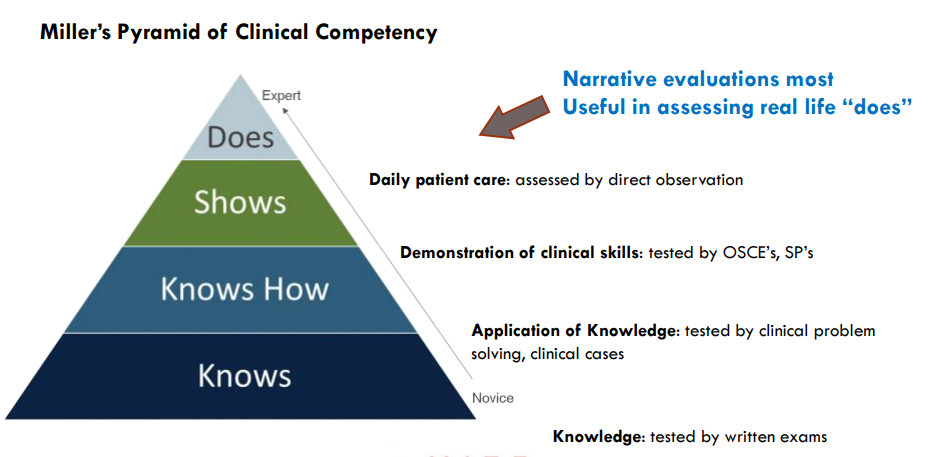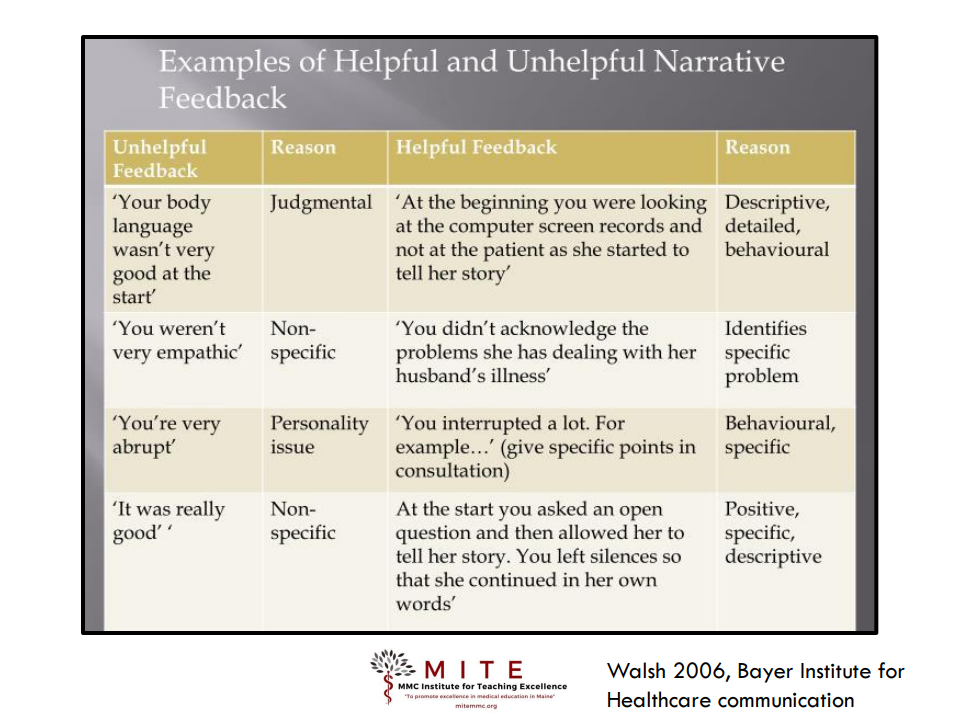Faculty Development Narrative Evaluations
Kalli Varaklis, MD, MMEdL Department of OB/GYN
Narrative Evaluations
- Narrative evaluations add dimension and important details to numeric evaluations, HOWEVER
- Many faculty encounter barriers in writing good narrative descriptions of learner performance:
- Knowledge about why narrative evaluations are important
- Skill to write useful narrative comments
- Time to add comments to every element of numeric evaluations
Why narrative evaluations?
- Add dimension to numeric evaluations
- Significantly improved physician performance with narrative evaluations (Westberg et al, 1991)
- Identified as a key tool in clinical teaching by experts in medical education (Irby et al, 2004)
- Narrative evaluations may inhibit entrenchment of undesirable performance traits and may enhance the development of learner strengths (Westberg et al 1991)
- Builds on strengths – not just lack of numeric performance
Where do learners really need narrative evaluations?

Good Narrative Evaluations
- Are descriptive
- Focus on a behavior that can be modified
- Are very specific
- Non-judgmental
- Are relevant to the knowledge/skills/attitude the learner is trying to achieve
- Offers suggestions for improvement or refinement

How to write useful Narrative Evaluations
- Alternative framework
- What was done well and should continue?
- “Hysteroscopic assessment of the uterus was very thorough”
- What should be done differently?
- “Utilize 30 degree lens to minimize trauma was scope insertion”
- What should be done more?
- “practice putting the hysteroscope together to increase familiarity with equipment and trouble-shooting ability”
- What should be done less or eliminate?
- “prophylactic antibiotics are not indicated for diagnostic hysteroscopy”
- What was done well and should continue?
- ACGME Competency-based Framework
- Medical Knowledge
- Patient care
- Communication
- Problem-based learning and improvement
- Professionalism
- System-based practice
“Articulates the rationale for antibiotic choice for lower genital infections. Needs to remember to solicit patient allergies before prescribing antibiotics and to consider using “teach back” strategies to make sure the patient understands the dosing. Was very respectful of the patient’s privacy concerns and needs to remember to offer treatment to her partner”
References
- Miller GE. The assessment of clinical skills/competence/performance. Acad Med 1990;65:S63-7.
- “A Programmatic View on Assessment” Cees van der Vleuten. ACGME 2015 Marvin R Dunn Keynote Address
- Ramani S, Leinster S, AMEE Guide no 34: Teaching in the clinical environment. Medical Teacher, 2008:30(4):347-364.
- Accreditation Counsil for Graduate Medical Education. www.acgme.org
- Jones, C., Pinchin S., Fostaty-Young, S. “Narrative Evaluations” Bayer Institute of Healthcare Communication
- Westberg J, Jason H. “The Enhancement of Teaching Skills in US Medical Schools: An overview and some Recommendations” Med Teach 1981;3(3):100-4
